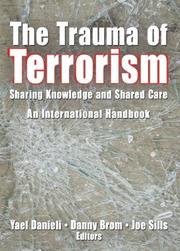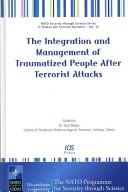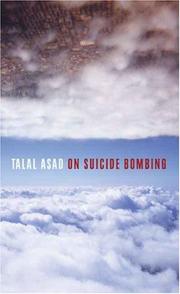| Listing 1 - 10 of 39 | << page >> |
Sort by
|

ISBN: 0429235895 1136747044 0203819985 1299287107 1136747052 9781136747052 0789027720 9780789027726 0789027739 9780789027733 Year: 2004 Publisher: Binghamton, NY Haworth Maltreatment & Trauma Press
Abstract | Keywords | Export | Availability | Bookmark
 Loading...
Loading...Choose an application
- Reference Manager
- EndNote
- RefWorks (Direct export to RefWorks)
Learn intervention strategies to counter the effects of terrorismIn the twenty-first century, terrorism has become an international scourge whose effect devastates individuals, weakens societies, and cripples nations. The Trauma of Terrorism: Sharing Knowledge and Shared Care, An International Handbook and Shared Care provides a comprehensive, penetrating look at the effects of terrorism, at the prevention and treatment of immediate and long-term sequelae, at preparedness for terrorism, and at the range of individual, community, and national responses. International authorities dis
Book
ISBN: 1476623724 Year: 2016 Publisher: Jefferson, North Carolina : McFarland & Company, Incorporated, Publishers,
Abstract | Keywords | Export | Availability | Bookmark
 Loading...
Loading...Choose an application
- Reference Manager
- EndNote
- RefWorks (Direct export to RefWorks)
"This account describes how initial attacks on economic targets turned into a series of terror bombings causing the deaths of seven innocent people. The author covers the political situation in Ireland prior to the attacks, recruiting and training of the bombers, the bombing campaign and the trial of two men for the murder of five people in Coventry"--
Bombings --- Political violence --- Victims of terrorism --- Bombers (Terrorists) --- Trials (Terrorism) --- History --- Irish Republican Army --- Ireland --- Politics and government
Book
ISBN: 271841488X 9782718414881 9782718414812 2718414812 Year: 2017 Publisher: Montrouge Arnette
Abstract | Keywords | Export | Availability | Bookmark
 Loading...
Loading...Choose an application
- Reference Manager
- EndNote
- RefWorks (Direct export to RefWorks)
Présentation de l'éditeur : "Se préparer, organiser et optimiser la prise en charge des victimes en coordonnant l'action pluridisciplinaire des professionnels de santé (services secours et médicaux. La survenue d'un attentat terroriste, brutal, violent et imprévisible est une menace actuelle. En particulier, les attentats terroristes peuvent provoquer de nombreuses victimes à l'origine d'afflux massif sinon saturant. Aux modes opératoires très variés : explosion, arme à feu, menace nucléaire radiologique bactériologique chimique, les attaques terroristes sont à l'origine de lésions et de blessures tout aussi diverses. La prise en charge immédiate nécessite une bonne coordination des équipes médicales avec les forces d'intervention. L'organisation des secours doit permettre l'application de gestes de sauvetage essentiels pour assurer la survie des blessés. À leur accueil à l'hôpital, l'orientation des victimes suit des plans dédiés à la prise en charge de nombreuses victimes grâce à l'ensemble des équipes d'urgence, anesthésie-réanimation et chirurgicales. La stratégie de damage control s'applique comme un principe de prise en charge de sauvetage, depuis les lieux de l'attaque jusqu'au bloc opératoire. Les bilans de biologie et de radiologie suivent également un principe de prescription raisonnée et dédiée. Destiné aux médecins et aux infirmiers des équipes médicales pré-hospitalière et hospitalière, cet ouvrage se propose de présenter les particularités de la prise en charge des blessés par attentat terroriste, sur les lieux immédiats de l'attaque, puis à l'hôpital et enfin pour la prise en charge psychologique des victimes et de leur entourage"
Victims of terrorism. --- Terrorism victims --- Victims of crimes --- Wounds and Injuries --- Crime Victims --- Terrorism --- Disaster Planning --- Mass Casualty Incidents --- Emergency Medecine

ISBN: 6611029710 1281029718 9786611029715 1607502208 6000005814 1435608542 9781607502203 9781435608542 1586037048 9781586037048 9781586037048 Year: 2007 Publisher: Amsterdam Oxford IOS Press
Abstract | Keywords | Export | Availability | Bookmark
 Loading...
Loading...Choose an application
- Reference Manager
- EndNote
- RefWorks (Direct export to RefWorks)
Brings together papers from academics and experts to develop a concept on the treatment of traumas and depression caused by terrorist attacks and the integration of the victims into society.
Victims of terrorism --- Psychic trauma --- Social integration --- Emotional trauma --- Injuries, Psychic --- Psychic injuries --- Trauma, Emotional --- Trauma, Psychic --- Psychology, Pathological --- Terrorism victims --- Victims of crimes
Book
ISBN: 849031974X 9788490319741 9788490314425 849031442X Year: 2021 Publisher: Madrid, Spain : Editorial DYKINSON, S. L.,
Abstract | Keywords | Export | Availability | Bookmark
 Loading...
Loading...Choose an application
- Reference Manager
- EndNote
- RefWorks (Direct export to RefWorks)
Victims of terrorism --- Víctimas del terrorismo --- Terrorism --- Terrorismo --- Terrorism victims --- Victims of crimes --- Legal status, laws, etc --- Situación legal --- Legal status, laws, etc.

ISBN: 0375411402 Year: 2006 Publisher: New York Knopf
Abstract | Keywords | Export | Availability | Bookmark
 Loading...
Loading...Choose an application
- Reference Manager
- EndNote
- RefWorks (Direct export to RefWorks)
Life change events --- Loss (Psychology) --- Married people --- September 11 Terrorist Attacks, 2001 --- Victims of terrorism --- Services for --- New York (N.Y.)
Book
ISBN: 3110581507 3110578441 3110579200 9783110578447 Year: 2018 Publisher: De Gruyter
Abstract | Keywords | Export | Availability | Bookmark
 Loading...
Loading...Choose an application
- Reference Manager
- EndNote
- RefWorks (Direct export to RefWorks)
The history of terrorism has been largely a history of perpetrators, their motives and actions. The history of their victims has always seemed to be of secondary importance. But terrorism is communication by violence, and its efficiency depends significantly on the selection and the treatment of the victims by the perpetrators, on the one hand, and the perception and acknowledgement of victimhood by the public, on the other. How does it affect our picture of the history of terrorism then, if the victims are moved centre stage? If the focus is put on their suffering, their agency, their helplessness, or on how they are acknowledged or exploited by society, politics and media? If the central role is taken into account which they play in terrorist propaganda as well as in the emotional response of the public? The contributions to this edition of the European History Yearbook will examine such questions in a broad range of historical case studies and methods, including visual history. Not least, they aim at historicizing the roles of survivors and relatives in the social process of coming to terms with terrorist violence, a question highly relevant up to the present day.
Terrorism. --- Victims of crimes. --- Victims of terrorism. --- HISTORY / Europe / General. --- Acts of terrorism --- Attacks, Terrorist --- Global terrorism --- International terrorism --- Political terrorism --- Terror attacks --- Terrorist acts --- Terrorist attacks --- World terrorism --- Direct action --- Insurgency --- Political crimes and offenses --- Subversive activities --- Political violence --- Terror --- Terrorism victims --- Victims of crimes --- Crime victims --- Victimology --- Victims --- Victims of terrorism --- Terrorism
Book
ISBN: 1003154026 1000564541 0367722461 100056455X Year: 2022 Publisher: Taylor & Francis
Abstract | Keywords | Export | Availability | Bookmark
 Loading...
Loading...Choose an application
- Reference Manager
- EndNote
- RefWorks (Direct export to RefWorks)
This book examines the survivors of political violence and terrorism, considering both how they have responded and how they have been responded to following critical incidents. As this work demonstrates, survivors of comparatively rare and spectacular violence hold a mirror up to society's normative assumptions around trauma, recovery, and resilience. Drawing on two years of observational field research with a British NGO who work with victims and former perpetrators of PVT, this book explores contested notions of resilience' and what it might mean for those negotiating the aftermaths of violence. Examining knowledge about resilience from a multitude of sources, including security policy, media, academic literature, and the survivors themselves, this book contends that in order to make empirical sense of resilience we must reckon with both its discursive and practical manifestations. An accessible and compelling read, this book will appeal to students and scholars of criminology, sociology, victimology, criminal justice, and all those interested in the stories of survivors.
Victims of political violence. --- Victims of terrorism. --- Resilience (Personality trait) --- SOCIAL SCIENCE / Criminology --- Human resilience --- Resiliency (Personality trait) --- Personality --- Terrorism victims --- Victims of crimes --- Political violence victims --- Political violence --- Aftermath of violence --- Critical incidents --- Political Terrorism --- Political Violence --- Resilience --- Resilience of Survivors --- Security Policy --- Survivors of Terrorism --- Terrorism --- Victimology --- Victims of Political Terrorism --- Victims of Political Violence --- Victims of Terrorism

ISBN: 9780231141529 9780231511971 0231141521 0231511973 Year: 2007 Publisher: New York Columbia University Press
Abstract | Keywords | Export | Availability | Bookmark
 Loading...
Loading...Choose an application
- Reference Manager
- EndNote
- RefWorks (Direct export to RefWorks)
"Drawing on his extensive scholarship in the study of secular and religious traditions as well as his understanding of social, political, and anthropological theory and research, Asad questions Western assumptions regarding death and killing. He scrutinizes the idea of a "clash of civilizations," the claim that "Islamic Jihadism" is the essence of modern terror, and the arguments put forward by liberals to justify war in our time. He critically engages with a range of explanations of suicide terrorism, exploring many writers' preoccupation with the motives of perpetrators. In conclusion, Asad examines our emotional response to suicide (including suicide terrorism) and the horror it invokes."--Jacket.
Polemology --- Terrorism --- Suicide bombers --- Victims of terrorism --- Psychological aspects --- Religious aspects --- Islam --- Psychology --- Terrorism. --- 856.1 Conflictpreventie --- 845 Religie --- Terrorism victims --- Victims of crimes --- Bombers (Terrorists) --- Islam and terrorism --- Acts of terrorism --- Attacks, Terrorist --- Global terrorism --- International terrorism --- Political terrorism --- Terror attacks --- Terrorist acts --- Terrorist attacks --- World terrorism --- Direct action --- Insurgency --- Political crimes and offenses --- Subversive activities --- Political violence --- Terror --- Psychological aspects. --- Islam. --- Psychology. --- Suicide bombers - Psychology. --- Suicide bombers -- Psychology. --- Terrorism - Psychological aspects. --- Terrorism -- Psychological aspects. --- Terrorism - Religious aspects - Islam. --- Terrorism -- Religious aspects -- Islam. --- Victims of terrorism - Psychology. --- Victims of terrorism -- Psychology. --- Social Welfare & Social Work --- Social Sciences --- Criminology, Penology & Juvenile Delinquency --- Religious aspects&delete& --- Terrorism - Psychological aspects --- Terrorism - Religious aspects - Islam --- Suicide bombers - Psychology --- Victims of terrorism - Psychology

ISBN: 0745316743 0745316735 9780745316741 9781849640961 1849640963 9780745316734 Year: 2002 Publisher: London
Abstract | Keywords | Export | Availability | Bookmark
 Loading...
Loading...Choose an application
- Reference Manager
- EndNote
- RefWorks (Direct export to RefWorks)
An up-to-date insight into the long-term impact of political violence on the civil population of Northern Ireland.
Social conflict --- Protestants --- Catholics --- Victims of terrorism --- History --- Northern Ireland --- Irlande du Nord --- Histoire --- Terrorism victims --- Victims of crimes --- Christians --- Class conflict --- Class struggle --- Conflict, Social --- Social tensions --- Interpersonal conflict --- Social psychology --- Sociology --- Great Britain.
| Listing 1 - 10 of 39 | << page >> |
Sort by
|

 Search
Search Feedback
Feedback About UniCat
About UniCat  Help
Help News
News